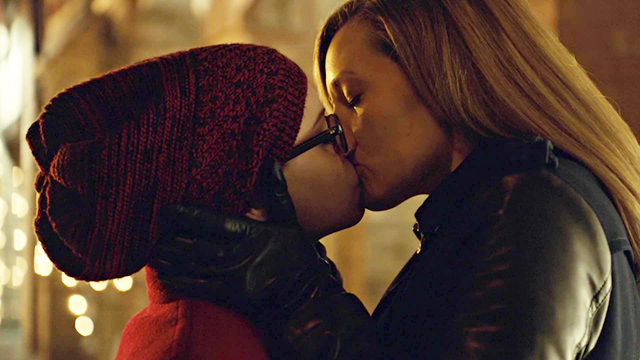Orphan Black ended its third season with a bang. A literal bang. Orphan Black shot Delphine Cormier in the chest! Due to an overload of other recaps, a plague on my house, and camp camp camp, I wasn’t able to finish recapping season three, but we absolutely have to talk about it, because it was shocking and wonderful and horrible and lovely and heartbreaking and shocking some more. Joining me for a roundtable discussion are the incomparable Laura Mandanas and Cameron Glavin, who has Cosima’s exact tattoo on her arm!
Let’s talk feminism, queerness, and poor Delphine. Ready? Yeah, us either, but we’ve got to do it anyway.
So. The Castor clones. Do you think they added or detracted from the show and the show’s overall feminist themes?
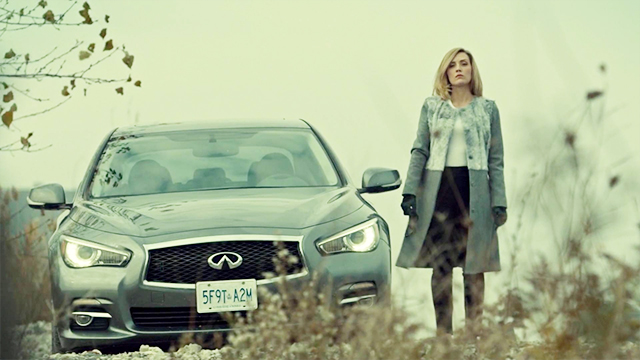
Laura M: I had a tough time with the Castor clones! Mostly because I had a hard time telling them apart. That scene where Rudy and Seth were creepily swapping places before they took that chick’s hair? Yeah, I totally missed what was going on until I saw them both on screen at the same time. I’m not sure if this was an issue with the acting, the costuming, or me generally not being able to tell white dudes apart, but it was a real struggle for me. I also didn’t find any of their storylines particularly engaging.
My main feeling is that I’m relieved they didn’t take too much time away from Tatiana Maslany being on screen.
Cameron: I wasn’t thrilled about the Castor clones, mostly because I was so worried that they were going to ditch the Leda storyline, focus on them, and become oh, every other sci-fi show ever. The whole big compelling thing about Orphan Black for me has always been that it’s this clash of complex, diverse female experiences, not as told by a brooding macho man (*cough* Paul *cough*).
I think the Castoes just became a thing to move the plot along. If you took out the whole Castor storyline, the Topside/Neolution twist could have replaced season three.
Like Laura, I had a hard time telling them apart until I knew what I was supposed to look for. The only thing I liked the Castor clones for was as a commentary on toxic masculinity and rape culture. Even so, I’m not sold on them. I’m infinitely happier that they didn’t overtake the Leda plot than anything else.
Heather: Yeah, I’m with you guys all the way. When Castor was revealed at the end of season two, I looked over at my girlfriend and I could tell we were both wondering who was going to set fire to something first. Look, I don’t like Angel or Spike or most of the time even Xander, okay? Plus, I thought it was fully delusional to assume any other person on earth could do even five percent of what Tatiana Maslany can do. I was predisposed to hate the Castors! I do feel like they took up way too much time that could have been used to explore more stuff about the Ledas we know and love, and Ms. S, and also Felix. Felix got the shaft more than any other character this season. Also, at the end of the day, all of them besides Mark are dead, so what was the point, kind of?
However! I’m agree for sure, Cameron, about the way the Castors showcased the dangers of toxic masculinity, which is one of the most feminist things the show has done, and I can’t ever remember seeing it on TV before. I think they also highlighted a lot of the grossness with rape culture, and the criminal justice system’s horrible responses to rape culture. The show never backed down on calling what the Castors were doing rape, either. And then to sort of equate rape culture with STI-based biological warfare, both in dialogue and in visuals, I thought that was some pretty shocking/compelling writing.
It could have taken up about 10 percent as much time, though.
I felt like this was the most unapologetically feminist season yet. What do you guys think?
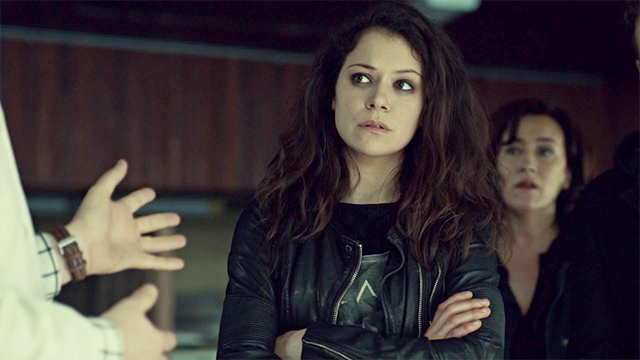
Laura M: I like that Sarah stopped ping-ponging around between different problematic men in her life. Helena’s pregnancy storyline and Siobhan’s… everything felt very overtly feminist to me. But Alison is still sort of cat-fighting with another woman. Delphine turns into a 2D scary stalker type. Cosima was too busy being sickly and having breakup drama to make major contributions to the investigation. (Well, she did contribute, but I feel like Scott did more this season.)
The season wasn’t not feminist, but I’m curious why you thought it was the most feminist, Heather.
Cameron: I’m with Laura on this one. I think they took huge leaps ahead of other shows when it came to addressing rape culture (pretty sure I actually cheered at Helena’s line to the dying Rudy) and how fucked up that is and that’s hands down amazing. But I think the character development got lazy and I had a hard time reconciling for that. Everyone just seemed pretty static from the end of season two. Helena’s development seemed hinged completely on her being pregnant and hallucinating talking scorpions, which doesn’t seem very revolutionary to me? Her Thing is still to function as an adorably homicidal monster carting around a canister of babies. I feel like the only characters who had any development were Donnie (I want to care, but I don’t), Siobhan, and Sarah. Donnie’s development was almost solely in accepting Helena as he does the other Leda clones. Sarah’s was in accepting Castor as a brother, but they’re all dead now, so…
But I can ride high on the whole taking down rape culture one line at a time thing for a while.
Oh, shit! And Krystal! The Elle Woods of Clone Club. Vacuous, blonde stereotype or secret intel compiling genius?
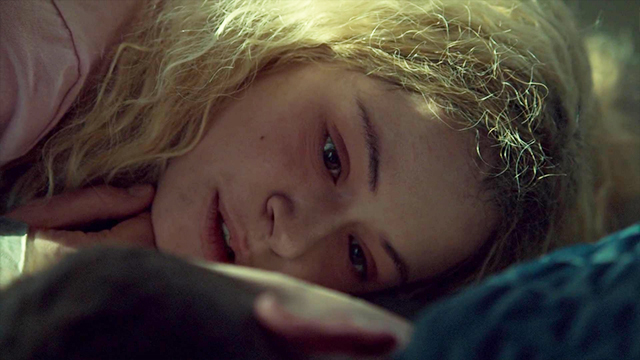
Heather: The Elle Woods of Clone Club, omg! You are so right!
In addition to the rape culture commentary, I thought this season had some other hugely feminist threads weaving it together. It actually reminded me a lot of Mad Max and early days Wonder Woman, in that the central theme of this season was Women as Life-Givers vs. Men as World-Eaters. In both Mad Max and Wonder Woman, you see men raised up in this culture that insists on violence, sexual aggression, and a complete lack of emotions. Juxtaposed to that are these women who express strength and courage in really hardcore physical ways, but also are empowered by their super smarts and uncommon compassion and (most of all) their ability to lean in on and rely on each other to form a collective of kickassery. And to really drive that point home, you’ve got men hurling havoc and death at a helpless world, while women at different stages of motherhood fight back and bring literal life to the world. I thought that point landed so poignantly with dying Rudy trying to tell Helena that they are the same, right, because she was raised as a killer too. And Helena, pregnant with her science babies, lays down beside him on the floor and, in a show of compassion he could never match, pets his head and says, “No. You are a rapist.”
What a gorgeous fucking juxtaposition.
But on a more micro level: Alison’s story, to me, wasn’t just about her winning a school board election. It was about her stepping out of her role as a submissive housewife whose autonomy had been stripped away by Dyad for her whole life, and building her own empire. Like, yeah it was kind of the plot of Weeds, but it was Ali who had the business acumen, Ali who had the confidence to make promises to scary dealers (and deliver on them), Ali who won an election; even the way Ali’s scenes with Donnie were framed, she was in focus in the foreground, and he was behind her, at least slightly out of focus. OR they were framed as equals, as partners, which, when you think about that compared to season one Alison, is like bang-the-drum remarkable. For me, this season was about Alison taking control of her own life in her own small world, which is the ultimate triumph for her.
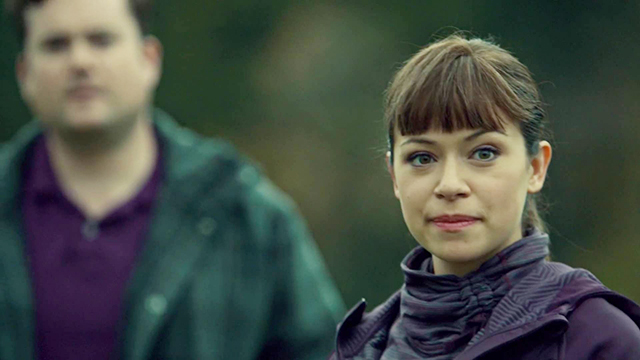
I think Delphine’s journey was similar. My struggle with her was never whether or not she loved Cosima. I felt like she loved Cosima immediately and without exception or reason. My struggle was whether or not she was an unwitting pawn in Leekie’s game. So seeing her stepping outside the rules of romance, outside the rules of Dyad, outside the rules of Topside, and duplicitously working the system that once held her under its thumb — because of her love for another woman! — was so satisfying to me. Delphine did it all for her love for Cosima, and I think the show plainly wanted us to know that because they put the words right into Cosima’s mouth to say to Delphine before she died. And oh! How she died! “Give my love to your sisters” was superfluous because Delphine’s love for Cosima’s sisters caused her to literally sacrifice herself, walking like a fucking stately queen to her own death, as a last act of bravery to keep Cosima and Sarah and Alison and Helena and Krystal and Rachel safe. Delphine, too, was without autonomy in season one, and in the end, she was master even over her own death.
And Ms. S! And Krystal! I’ll talk about Helena more in a minute, because I think she became my favorite TV character ever this season.
You’re right on about Sarah, Laura. Her character was infinitely better when she was threatening to kill Paul and sending Cal to the frozen tundra so she could focus on saving her sisters.
What do you think about the decision to have the main love story of the season be a queer one between Cosima and Delphine and Shay? That felt pretty revolutionary to me.
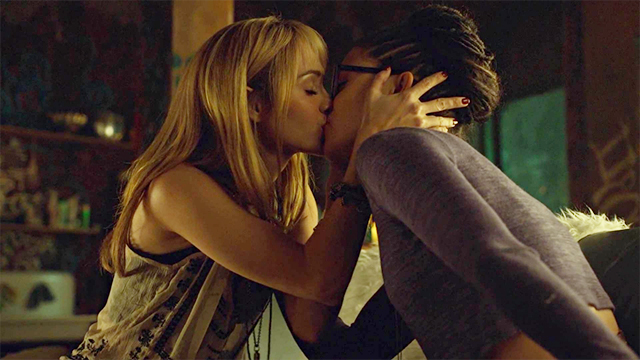
Laura M: I didn’t like the pair’s chemistry, but I agree with you that it was a big deal to make this the central romance!
Cameron: I’m a Cophine shipper for life. So this is a hard question for me. I love Ksenia Solo, but I love Delphine more. This is totally biased and unfair. But to answer the real original question: Yes. I totally think it’s a big deal to have a queer triangle as the main relationship focus.
Heather: I thought the show was really smart to cast Ksenia Solo as Shay. Really smart. And I do think it was remarkable that the romantic emotional punches this season were all strategically placed around this queer female love triangle. I only wish it hadn’t taken Cosima out of doing the work when it came to saving her sisters, you know? (She could have done both if the Castors hadn’t eaten up so much screen time!)
Who was your favorite clone this season? Why?
Laura M: Alison’s storyline doesn’t tie into the bigger plot as much as the other clones, but I love her a lot. I think she has a good heart and very, very poor decision making skills. I appreciated the comedic relief she provided!
Cameron: Ugh. Alison kills me in the best way. I think my favorite clone this season is Helena. I’ve always kind of liked how inaccessible she is—I feel like it’s harder to understand her because of her upbringing at her morals, but I think that makes her exploration of her new family and surroundings more interesting. Especially her relationship with Sarah and Mrs. S. She’s such a mama bear to her sestras, but still pretty unpredictable. You should not threaten babies.
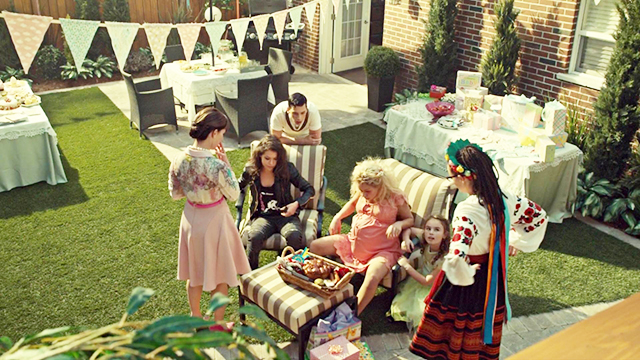
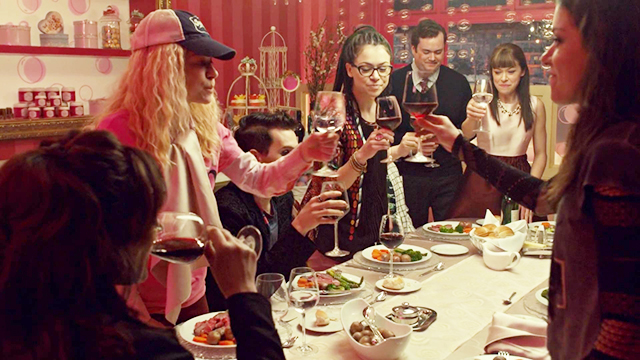
Heather: Helena. Helena times a hundred million bazillion. I pretty much burst into tears during the finale when I realized that clone dinner scene in Bubbles was basically exactly what Helena had dreamed when she was trapped in that box in the season premiere. Surrounded by her family in a hyper-color paradise eating all the sugar and eastern European delicacies Alison could bake. Helena, to me, is the apex of what humanity can aspire to be. Beaten down, bloody, broken, betrayed. Yet, somehow, her love and her loyalty are bigger than all that. She has more capacity for grace and compassion than all the other clones combined. She’s chaotic, but she’s Chaotic Good! This is Helena’s entire character summed up in one sentence, and my own personal dream for the manifestation of my feminism: “I break free my sestra. Now, Ms. S is my new mother and I live here and make soap and teach children karate.”
What did you think about the decision to kill Delphine? Does it fall into the Kill Your Gays trope, or have we, as a culture, moved past that trope because of the exponential growth of the number of queer characters on TV? (Does it matter less when they die now because there are more of them?)
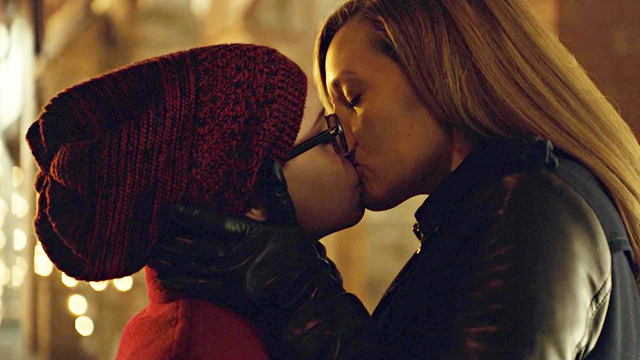
Laura M: I am very upset about this! Delphine had the best hair! In terms of the story, I really didn’t care for the direction they were taking her in. But did they have to kill her? Why couldn’t she be shipped to Iceland too? Or England? Or a Prolethean farmstead? We’ll see what Season four brings, but I feel like her death will inevitably serve as a kick in the butt to Cosima to drive some tragic plot point forward. I do think it fulfills the trope.
Cameron: I’m still processing this. I’m not okay. When she said, “Give my love to all your sisters” I knew it was going to happen and I knew that knowing that wasn’t going to make it any more okay. Again, I thought the writers got really lazy with her. In seasons one and two, I felt like there was a push and pull of Can I Trust You or Nah? Do I Like You or Nah? And this season they took away all of the softer qualities they cultivated for her (and her beautiful curly mane) and just said JK SHE’S SO COLD SHE’S BELOW ZERO DEGREES KELVIN.
I don’t think her death was justified. I don’t think it served much of a purpose other than to be a cliffhanger and to get rid of Evelyne Brochu’s character. So, yeah. I totally think it falls into the Kill Your Gays trope, more-so because the Delphine/Cosima relationship canon drew in so many queer viewers. The writers messed with viewers on Twitter about it, too, in saying that Cophine would be even more of a thing by the end of the season. IS THIS IS WHAT YOU MEANT, WRITERS?
But on a more chill, reasonable, totally not emotionally attached to fictional characters level: From what I understand, they couldn’t book Evelyne Brochu for season four because of scheduling conflicts because I guess she got a title role in another show NBD. Regardless. I hold out hope for Delphine’s return. That was NOT a fatal shot. No body, no confirmed death. That’s what I’ve learned from TV.
Heather: I think the show (purposefully, systematically) did everything right about killing Delphine. They let her go out as a hero who proved her love to Cosima after beating some asses and getting real gross with Rachel’s empty eye-socket. They killed Paul, the handsome straight white guy, who was really her counterpart in every way, in terms of love interests on the show. And they brought in another queer character, which felt like an acknowledgment that the writers know queer representation matters, and a promise that they aren’t going to sideline Cosima’s sexuality because Delphine is gone.
With my head I can see all that, but goddammit, man, it broke my heart! I can’t believe how much it broke my heart!
How would you compare this season, overall, to the other two?
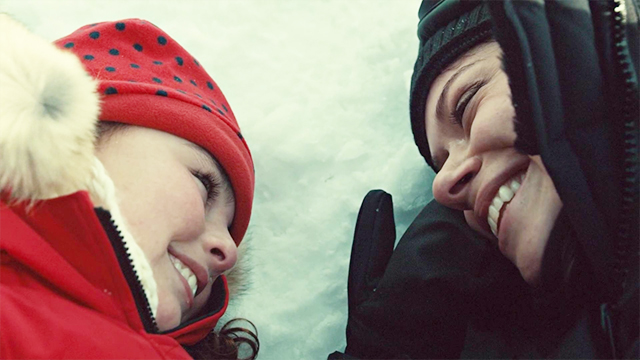
Laura M: This was the weakest season for me. I found the plot to be complex without purpose and I was frequently annoyed by what was happening. There are so many threads dangling from the first season and a half — are they ever going to address how the clone club first came to meet, for example? I don’t feel like the writers have a clear plan and the fact that they kept adding these weirdo twists made me worry that this is going to end up like Lost.
Get back to your roots, writers! Please rewatch season one! I want more of that.
Cameron: AGREE. Helena’s still carrying around that canister of frozen eggs, Cosima has been dying for all three seasons now (eventually the other non-mirror twin Ledas will start showing symptoms, right?), Kira’s still a lizardbaby from outer space but now with snowmobile privileges, Rachel… I don’t even know with Rachel. Now the Neolutionists are making this grand return. I was originally consoled by the fact that they’d decided on a five season run because I figured that they probably knew where they were headed with all of this. Now, I’m not so sure.
I felt like this season was all about surprising us and not engaging us with a solid plot or theme. There were good lines and moments, but it just does not compare with the seasons one and two.
But the real question: Where’s Tony?
Heather: I don’t think anything’s going to ever compare to season one, but I liked this season a whole lot more than season two. It had a focus the second season lacked, and it eased up the pace so we could delve more into character studies than get hammered over the head with PLOT PLOT PLOT, which was a huge problem last year. Like the writers thought if they just kept the pace as breathless as possible, no one would stop to question the science or the sci-fi logic holes. I mean, you’ve got the best character actor working in television today; why in the world would you sacrifice pathos for plot? I’m glad the Castors are gone though. I’m sorry we wasted character development time on them. I hope Mark and Gracie skedaddle into the sunset and we never have to see them again.
Okay, sestras and brother-sestras, your turn! What did you think of Orphan Black’s third season?



